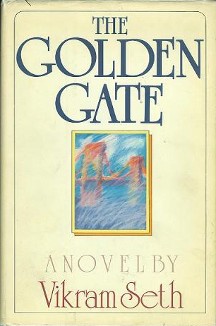 First edition | |
| Author | Vikram Seth |
|---|---|
| Language | English |
| Publisher | Random House |
Publication date | March 12, 1986 |
| Publication place | United States |
| Media type | Print (Hardcover) |
| Pages | 307 pp |
| ISBN | 0-394-54974-0 |
| OCLC | 12081140 |
| 813/.54 19 | |
| LC Class | PR9499.3.S38 G65 1986 |
The Golden Gate (1986) is the first novel by poet and novelist Vikram Seth. The work is a novel in verse composed of 590 Onegin stanzas (sonnets written in iambic tetrameter, with the rhyme scheme following the aBaBccDDeFFeGG pattern of Eugene Onegin). It was inspired by Charles Johnston's translation of Pushkin's Eugene Onegin .